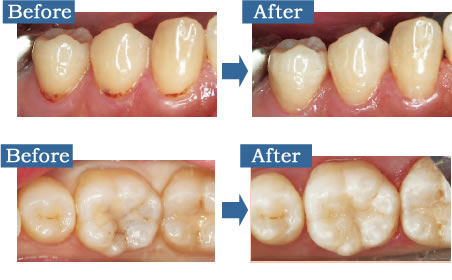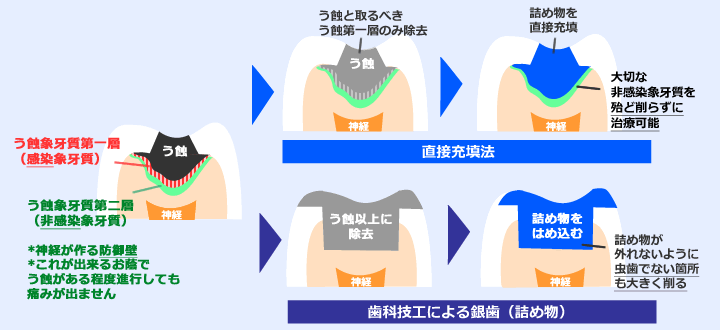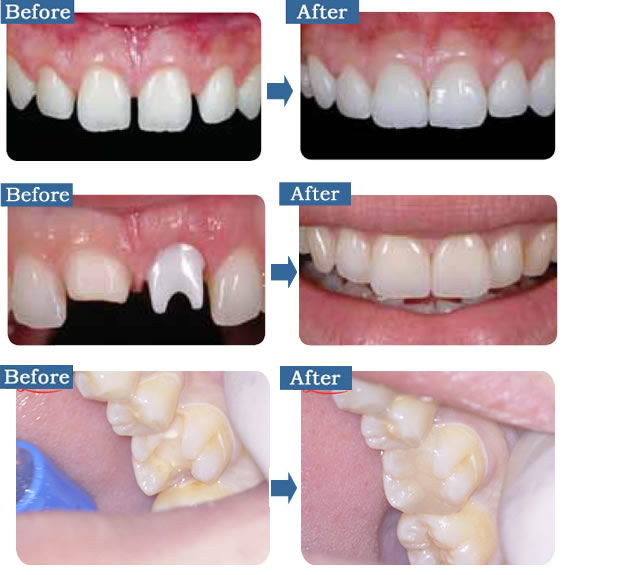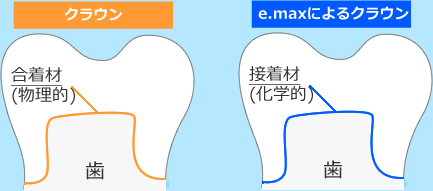Cosmetic dentistry

Dental caries treatment and direct filling of hybrid ceramics
Direct filling of hybrid ceramics is the treatment method to remove only caries and fill the cavity with organic glass which contains tooth-like ceramics. This method can minimize the amount of tooth to be shaved and tooth-friendly. Compared to plastic filling covered by insurance, hybrid ceramics is harder and therefore requires high skills to fill. As the dentist’s techniques influence the result, not many dentists adopt this treatment. We have many examples of treatments and therefore recommend with confidence.

Difference between direct filling method and silver-plugged tooth
As for silver-plugged tooth with dental technique, good tooth needs to be shaved much to fix the silver filling. However, good tooth is hardly shaved in direct filling method.

You usually have just a single treatment for direct filling method as it is unnecessary to take an impression of teeth. We use hybrid ceramics made from organic glass called super-hard resin and ceramic powder, which is as hard as tooth and transparent, having aesthetic quality. We use Gradia Direct or Majesty by Kuraray. Whether hybrid ceramic direct filling treatment is possible or not depends on part and state of decayed tooth, so please contact us. This method is not suitable if the cavity is large.
Prices of hybrid ceramic direct filling:
| bicuspid tooth | 45,000円 |
|---|---|
| molar tooth | 55,000円(Not including tax) |
* Prices vary for tooth surface and size. This method is not covered by insurance.
- Advantages of hybrid ceramic direct filling
- Good tooth is hardly shaved
- Treats in a short period of time as it is unnecessary to take an impression of teeth
- More transparent and glossy compared to plastic filling covered by insurance, and hardly discolors keeping aesthetic quality
- Harder and less liable to cause deterioration of bonding surface compared to plastic filling covered by insurance (Hardly adhered with bacteria and less likely to cause caries)
- Gives no metallic allergy as no metal is used for treatment
- Disadvantages of hybrid ceramic direct filling
- Not suitable for large cavity
- Expensive than treatment covered by insurance
- Treatment time tend to be long
Please don’t hesitate to ask if you have any questions.
e.max, the newest material
e.max is the newest material made of most advanced ceramic material. It is excellent in strength and aesthetic quality. Although not many hospitals use this material as it was released a few years ago, we have many examples of treatments and therefore recommend with confidence.


Comparison with commonly used crown
e.max binds original tooth and crown chemically and you can expect stiffening effect of unification.
Material of e.max
Lithium disilicate (glass ceramics) that is a component of e.max has proper hardness and neither wears down nor damages interlocking natural tooth. It increases life-span of the natural tooth and can be used safe and comfortably. In addition, its bending strength (cracking resistance) is 400MPa, four times higher than commonly used ceramics.
| Material | Bending strength (cracking resistance) |
|---|---|
| All-ceramics | 80~120MPa |
| e.max | 360~400MPa |
Difference with traditional artificial tooth
Traditional artificial tooth is made by mixing ceramic powder and water, and then baking in high heat. Impurities in water and dust in the air sometimes cause impurities and bubble in the artificial tooth, which leads color muddiness and deterioration of strength due to incomplete bonding. On the other hand, no impurity mixes in e.max which uses ceramic block manufactured in the clean room of a factory. As a result, high purity artificial tooth can be stably produced. e.max blends seamlessly with neighboring tooth as it has a wide array of colors and also transparent. Especially the boundary with gum is like of natural tooth, having good aesthetic quality.
Prices: e.max: 90,000 yen for bicuspid tooth, 100,000 yen for molar tooth (Not including tax)
Zirconia inlay: 100,000 yen for bicuspid tooth, 110,000 yen for molar tooth (Not including tax)
* Prices vary for tooth surface and size. This method is not covered by insurance.
- Advantages of e.max
- High strength and durability
- Reproduces color, transparency, and intensity of natural tooth
- Bonds to natural tooth strongly and less likely to get cavities
- Has proper hardness and doesn’t damage natural tooth
- Gives no metallic allergy as no metal is used for treatment
- Disadvantage of e.max
- May be affected by the color of natural tooth (solvable by using glue which blocks color)
Please don’t hesitate to ask if you have any questions.